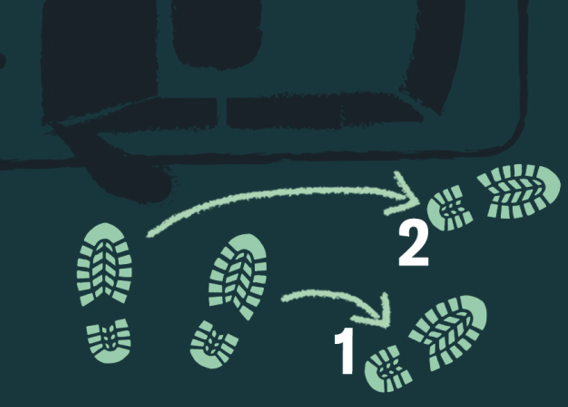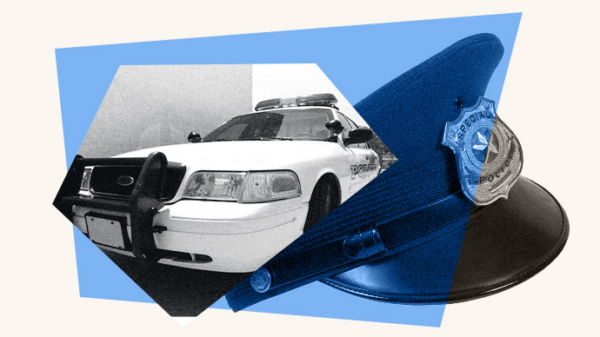Shaw v. Smith (previously Jones)
- Status: Victory!
- Latest Update: Feb 06, 2026

On January 30, 2020, the ACLU of Kansas filed a lawsuit challenging the Kansas Highway Patrol’s practice of unconstitutionally targeting motorists with out-of-state plates traveling to and from Colorado and routinely employing a training technique known as the “Kansas Two-Step.” We represent several individuals who were stopped and detained by KHP troopers for traffic infractions, and were then detained for a canine sniff of their vehicle, without adequate reasonable suspicion, in violation of the Fourth Amendment.
If you believe you have been affected by the Kansas Highway Patrol’s unlawful detainment, please submit a detailed complaint through our legal intake form.
The lawsuit, Shaw et. al v. Jones et. al, filed in the U.S. District of Kansas, seeks injunctive and declaratory relief for three named plaintiffs stopped and illegally detained by the KHP for driving a car with out-of-state plates and visiting Colorado, a state that has legalized marijuana use. The case also seeks damages on behalf of Blaine and Samuel Shaw and Joshua Bosire for the illegal detentions they experienced.
“Drivers with out-of-state plates made up 93 percent of KHP stops in 2017,” the lawsuit said. “Further, out-of-state motorists driving through Kansas on I-70 constituted 96 percent of all of KHP’s civil forfeitures in 2019. Most of those motorists were drivers of color.”
Kansas Highway Patrol has maintained a practice of unlawfully detaining drivers after the initial purpose of the stop had been resolved to question drivers about their travel plans without consent or reasonable suspicion of criminal activity. KHP officers often use a maneuver nicknamed in law enforcement circles as the “Kansas Two-Step” to accomplish these illegal detentions, in which, after issuing a ticket or warning and telling the driver to have a safe trip, the officer turns his or her body, takes two steps toward the patrol car but returns to the driver’s window to ask if the driver would answer a few more questions. This technique is used to break off an initial traffic detention and attempt to reengage the driver in what would then be considered a consensual encounter. It is taught to all KHP officers and is included in KHP’s training materials.
KHP troopers will detain drivers based on innocent-travel indicia for this type of non-consensual questioning after the original purpose of the traffic stop has dissipated. Absent court intervention, the lawsuit’s plaintiffs, Blaine Shaw, Samuel Shaw and Joshua Bosire, fear they will endure continued unlawful detentions simply for traveling to what law enforcement officials consider a “drug-source state." The detained drivers endured canine unit searches and one endured a personal pat-down on the side of the highway.
The standard for this kind of invasion of privacy has to be higher than out-of-state plates, a Colorado destination, and minority status. This practice is unconstitutional on many levels. In 2016, the Tenth Circuit found in Lewis v. Vasquez that KHP troopers illegally relied on the fact that a driver was traveling from Colorado and other innocuous conduct to support their “reasonable suspicion” that the driver was trafficking drugs.
In July 2021, the State of Kansas filed an interlocutory appeal to the 10th Circuit Court of Appeals after the District Court ruled in the plaintiffs' favor on the issue of qualified immunity. Briefing was completed in November 2021 and the Court held oral argument March 21, 2022.
On June 6, 2022, the United States Court of Appeals for the 10th Circuit denied the Kansas Highway Patrol’s appeal, ruling in favor of the ACLU of Kansas’ clients. The decision upholds the lower court’s denial of the troopers’ motions for summary judgment, supporting the argument that qualified immunity could not be applied to the facts of the case and that a jury could conclude the troopers lacked reasonable suspicion to detain the plaintiffs. The case will now proceed in the District Court of Kansas.
On January 3, 2023, the District court bifurcated the cases for trial. Blaine Shaw's case against Trooper Douglas Schulte for damages arising from Schulte's unlawful detention of Shaw was tried before a jury beginning February 6, 2023 in the federal courthouse in Kansas City, Kansas. The jury found in Mr. Shaw’s favor, holding that Trooper Schulte detained Mr. Shaw in violation of his Fourth Amendment rights. Judge Vratil subsequently held that Trooper Schulte was not entitled to qualified immunity for this violation.
Joshua Bosire's claim for damages against Trooper Brandon McMillan was tried before a jury the week of April 24, 2023. The jury found in favor of Mr. Bosire, awarding both punitive and compensatory damages, finding that Trooper McMillan detained Mr. Bosire in violation of his Fourth Amendment rights.
The trial on Plaintiffs’ joint claims for injunctive and declaratory relief against Col. Herman Jones, KHP Superintendent, was heard in a bench trial that started May 1 before Judge Vratil in the U.S. District of Kansas and concluded May 26.
On July 21, 2023, the Court ruled against the Kansas Highway Patrol and in favor of motorists, ordering the KHP to stop its policies and practices of detaining motorists without reasonable suspicion and of the infamous Kansas Two-Step. Read our full statement here.
The Kansas Highway Patrol appealed the district court’s verdict to the Tenth Circuit Court of Appeals. Oral argument was held in October 2024. In January 2026, the Court ruled that the KHP's continued targeting out-of-state drivers was unconstitutional. It affirmed the district court's instruction to the KHP to revise its training and instructions to officers, while also reversing in part other remedial measures and calling for the district court to revise its injunction.
Previous 10th Circuit precedent, specifically under Vasquez v. Lewis, held that under the Fourth Amendment, an individual’s state of residency was not permissible justification to continue a traffic stop and that travel along I-70 could not be used as a basis for reasonable suspicion. While Vasquez became effective in 2016, the KHP did not adjust its training until after the ACLU filed Shaw in 2020. The 10th Circuit was unsparing in its criticism of KHP for failing to follow the Vasquez ruling and permitting an individual’s state of residency to be the basis for a traffic stop.
- Complaint.pdf
- Defense Memo Supporting Motion for Summary Judgment (Shaw claims)
- Defense Memo Supporting Motion for Summary Judgment (Bosire claims)
- Plaintiff Memo in Opposition to Summary Judgment (Bosire Claims)
- Plaintiff Memo in Opposition to Summary Judgment (Shaw Claims)
- Defense 10th Circuit Appellate Brief
- Plaintiffs' 10th Circuit Response Brief
- Shaw10th Circuit Opinion.pdf
- Plaintiffs Motion for Summary Judgment Against Superintendent Jones
- PLAINTIFFS’ MEMORANDUM IN OPPOSITION TO DEFENDANT JONES’ MOTION FOR SUMMARY JUDGMENT
- Plaintiffs Reply Memorandum.pdf
- Plaintiffs' Proposed Finding of Fact & Conclusions of Law
- 532 Pltf's Reply - Further Support of FOF / Conclusions of Law
- Memorandum and Order to Show Cause
- Permanent Injunction.pdf
- Order Granting Administrative Stay.pdf
- Appellees' Response Brief.pdf
- 10th Cir App Ct Opinion
Affiliate: KS
Download documentAffiliate: KS
Download documentAffiliate: KS
Download documentAffiliate: KS
Download documentAffiliate: KS
Download documentAffiliate: KS
Download documentAffiliate: KS
Download documentAffiliate: KS
Download documentAffiliate: KS
Download documentAffiliate: KS
Download documentAffiliate: KS
Download documentAffiliate: KS
Download documentAffiliate: KS
Download documentAffiliate: KS
Download documentAffiliate: KS
Download documentAffiliate: KS
Download documentAffiliate: KS
Download documentLearn More About the Issues in This Case
Stay Informed
Sign up to be the first to hear about how to take action.
By completing this form, I agree to receive occasional emails per the terms of the ACLU’s privacy statement.
By completing this form, I agree to receive occasional emails per the terms of the ACLU’s privacy statement.

